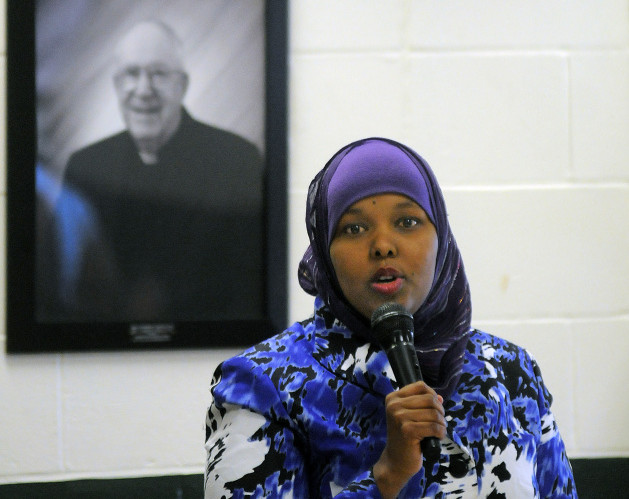WINTHROP — An activist, a college student and a grocery store owner. These are ordinary vocations for ordinary people, but the three panelists who spoke at the annual Faces of Immigration in Maine forum aren’t ordinary at all.
Alain Nahimana, of Biddeford, is the coordinator of the Maine Immigrants’ Rights Coalition, a nonprofit organization he has been a part of since arriving in Maine a few years ago.
Nahimana is from Burundi, a small, landlocked country in central Africa bordered by Rwanda, the Democratic Republic of the Congo and Tanzania. His parents and some other family members fled the political strife in Burundi and settled in Southern California more than a decade ago, but he remained in his homeland because he had hopes for the future.
“I thought it might become a peaceful, democratic country,” Nahimana said.
He decided to leave his home in Burundi and joined his family in 2010 in San Diego, which he said was too hectic and too big. He visited Portland two months later and never left, and he has seen a change in the way people view immigrants in Maine.
“What I am seeing in Maine is a lot of goodwill from people saying we need to stand and defend human rights,” he said. “I believe the pro-immigration movement can win.”
But Nahimana and others at the event said the language barrier is a constant block to immigrants becoming a part of the community, finding gainful employment and assimilating to the culture.
“Language is the biggest barrier to immigrant integration,” Nahimana said. “There are people coming here that have skills but don’t speak the language. We need to challenge the model for immigrant integration.”
More than 60 people from diverse backgrounds attended the Martin Luther King Jr. Day event held at the St. Francis Xavier Roman Catholic Church in Winthrop. Winthrop Congregational Church Pastor Chrissy Cataldo led the event and was joined by clergy from across the region.
Fahmo Ahmed left Somalia and landed in Minneapolis 11 years ago before moving to Lewiston a year later. She graduated from Central Maine Community College and is working to complete her degree in counseling at the University of Southern Maine. Ahmed would like to run for office because she believes in inclusion.
“I want to help this community find common ground,” Ahmed said. “We need to share stories, because we are all immigrants.”
Ahmed said she came to America more than a decade ago because in America, “there is a world of possibilities where you can be whatever you want and find your identity.”
But Ahmed said living as one of the approximately 5,000 Somalians in Lewiston still has its challenges, particularly in dealing with stereotypes.
“I had a classmate tell me that all Somalians had chickens in their closet,” Ahmed said. “I told her to come to my house and if there’s a chicken, we will grill it.”
Ahmed, a Muslim, said she often uses humor when encountering situations of profiling, usually at the airport.
“I have a hard time being a Muslim because people have their assumptions,” Ahmed said. “But I am a proud American, and I would defend my country from anyone who tries to do something bad.”
The third panelist, Khalid Zamat owns Mainly Groceries on Northern Avenue in Augusta. Zamat came to the U.S. in 2005 from Iraq seeking a better life for himself and his family. Since arriving in Augusta three years ago, Zamat has been a prominent figure and an elder statesman among the capital city’s Iraqi community.
“The first thing in my mind when I got here was whether people would accept me or not,” Zamat said. “But so many years later, nobody asks me about my religion or my country. They just know us as Americans and say hi.”
The panelists were joined by Rep. Craig Hickman, D- Winthrop, who joked that he too is an immigrant because he moved to Maine from Massachusetts.
“When I moved here, I had dreadlocks, and people just thought I was a Jamaican migrant worker,” Hickman said. “They’d ask my husband if I spoke English.”
Hickman said the message of King and the civil rights movement is still important more than 50 years after King’s famous “I Have a Dream” speech because of the problems facing immigrants today.
“The march isn’t over,” Hickman said. “Poverty is a big problem and it especially affects people who have come here fleeing tyranny and seeking refuge from persecution and unspeakable violence. If we are going to have a society where everyone can feed themselves, we have to come together and continue the march. That’s why a day like this and a subject like this is important.”
Cataldo, who is originally from the Knoxville, Tennessee, area echoed the sentiments of the speakers who said that education is a way to help change the narrative about immigration.
“Some of the difficulty is that the problem was created over many generations, and there is no quick fix,” Cataldo said.
She said the work of the civil rights movement was a step in the right direction, but “we still have much more work to do. Humanity likes to be nasty to one another, but we try hard to continue doing the good work.”
As the event concluded, officials collected cash to be donated to Nahimana’s organization.
“This is the greatest country in the world with a lot of opportunities,” Nahimana said. “This way of getting together is the way to make a difference.”
Jason Pafundi — 621-5663
Twitter: @jasonpafundiKJ
Send questions/comments to the editors.





Comments are no longer available on this story